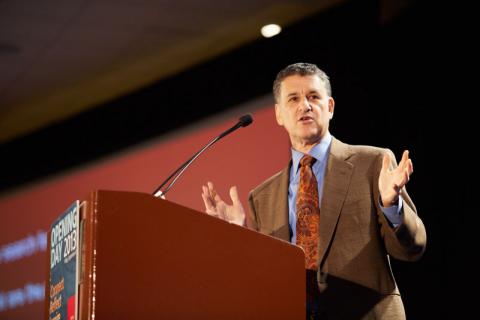Berklee Ushers in the New Academic Year

Alumnus Daniel Levitin delivers the Opening Day address.
Photo by Kelly Davidson
As students returned to Berklee for the fall semester, ready to make, produce, and perform music, faculty, and staff got a welcome back of their own, as well as a primer on the science behind why we're so hardwired to respond to music.
"Connect, Reflect, Inspire" was the theme of this year's Opening Day, held September 6 at the Westin Copley Place Boston. Following performances by the Berklee Roots Ensemble and a faculty group featuring Jetro Da Silva on piano, Ron Savage on drums, and Ron Mahdi on bass, and addresses by senior vice president for academic affairs/provost Lawrence Simpson and president Roger H. Brown, alumnus Daniel Levitin '80 talked about the cognitive science of music. Levitin was introduced by music production and engineering associate professor Susan Rogers, who studied music cognition and psychoacoustics under him at McGill University.
The cognitive psychologist, neuroscientist, record producer, musician, and writer, is the author of the bestselling This Is Your Brain on Music: The Science of a Human Obsession and The World in Six Songs: How the Musical Brain Created Human Nature. Levitin shared theories on musical expertise, and how many practice hours are required for world-class expertise; how from an early age our brains can discern chord progressions; and how it's not only melody and rhythm that define a sound, but also timbre.
He also warned against a one-size-fits-all approach. "As we begin to search for what it means to be musical, we need to cast a wide net."
Levitin fondly remembered his time at Berklee, where he studied guitar and saxophone and majored in performance. In addition to practical applications such as ear training and rhythm changes, the college taught him larger life lessons. "You taught me that hard work pays off," he said. "You taught me that life, like music, has difficult passages that can be managed if they can just be broken up into little bits."
